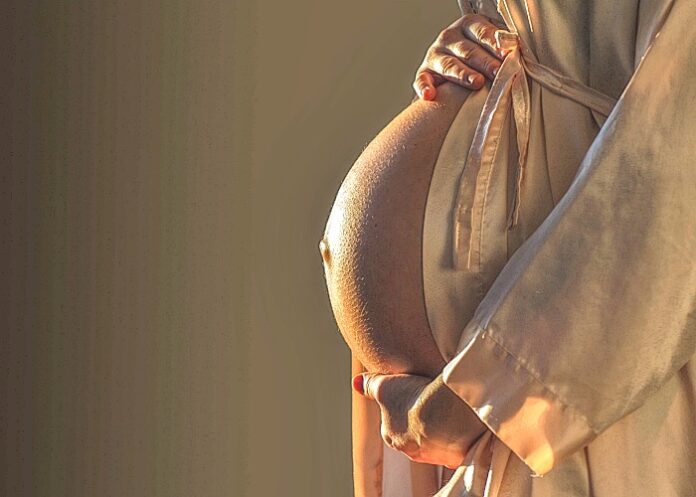Unvaccinated pregnant women with COVID-19 are more likely to have poor birth outcomes, including preterm birth, small for gestational age, low birth weight, and stillbirth. The findings were published in the journal The Lancet Digital Health and are among the first that account for the trimester of SARS-CoV-2 infection on birth outcomes.
The poor outcomes of preterm birth and stillbirth were observed primarily with those infected with SARS-CoV-2 during the first or second trimester, whereas increased rates of small for gestational age were driven largely by third trimester infection.
An Institute for Systems Biology-led (ISB) study examined the electronic health records of more than 18,000 people with SARS-CoV-2 tests during pregnancy. Researchers compared outcomes of unvaccinated people with a positive test during pregnancy, 882 in total, with those who tested negative.
“We found that SARS-CoV-2 infection indicated increased rates of preterm delivery and stillbirth, largely driven by first and second trimester infections,” said Samantha Piekos, PhD, first author of the study. “The single greatest predictor of gestational age at delivery is gestational age at infection, with earlier age at infection associated with earlier age at delivery.”
The people in the study had mild or moderate SARS-CoV-2 infections. Severity of maternal COVID-19 infection was not correlated with gestational age at delivery. Additionally, poor birth outcomes were present even if maternal COVID-19 didn’t result in severe respiratory problems during infection.
People in the SARS-CoV-2-positive cohort were more likely to have Hispanic ethnicity, race other than Asian or white, Medicaid insurance, lower age, higher BMI, lower education attainment, and other factors known to be associated with negative birth outcomes. To account for this and to make a true apples-to-apples comparison, researchers used a statistical matching technique that controlled for the confounding variables.
“Pregnant people are at an increased risk of adverse outcomes after SARS-CoV-2 infection, even when maternal COVID-19 is less severe, and they may benefit from increased monitoring following infection,” said Dr Jennifer Hadlock, corresponding author of the paper and assistant professor at ISB. “Both maternal and foetal health are at increased risk with COVID-19. Therefore, this reinforces the importance of protecting pregnant women.”
The study was conducted before COVID-19 vaccines were widely available in the United States. There is an opportunity for future studies to examine whether vaccination helps to prevent negative birth outcomes in breakthrough cases.
Study details
The effect of maternal SARS-CoV-2 infection timing on birth outcomes: a retrospective multicentre cohort study.
Samantha Piekos, Ryan Roper, Yeon Mi Hwang, Tanya Sorensen, Nathan Price, Leroy Hood, Jennifer Hadlock.
Published in The Lancet Digital Health on 13 January 2022.
Background
The impact of maternal SARS-CoV-2 infection remains unclear. In this study, we evaluated the risk of maternal SARS-CoV-2 infection on birth outcomes and how this is modulated by the pregnancy trimester in which the infection occurs. We also developed models to predict gestational age at delivery for people following a SARS-CoV-2 infection during pregnancy.
Methods
We did a retrospective cohort study of the impact of maternal SARS-CoV-2 infection on birth outcomes. We used clinical data from Providence St Joseph Health electronic health records for pregnant people who delivered in the USA at the Providence, Swedish, or Kadlec sites in Alaska, California, Montana, Oregon, or Washington. The SARS-CoV-2 positive cohort included people who had a positive SARS-CoV-2 PCR-based test during pregnancy, subdivided by trimester of infection. No one in this cohort had been vaccinated for COVID-19 at time of infection. The SARS-CoV-2 negative cohort were people with at least one negative SARS-CoV-2 PCR-based test and no positive tests during pregnancy. Cohorts were matched on common covariates impacting birth outcomes, and univariate and multivariate analysis were done to investigate risk factors and predict outcomes. The primary outcome was gestational age at delivery with annotation of preterm birth classification. We trained multiple supervised learning models on 24 features of the SARS-CoV-2 positive cohort to evaluate performance and feature importance for each model and discuss the impact of SARS-CoV-2 infection on gestational age at delivery.
Findings
Between March 5, 2020, and July 4, 2021, 73 666 pregnant people delivered, 18 335 of whom had at least one SARS-CoV-2 test during pregnancy before Feb 14, 2021. We observed 882 people infected with SARS-CoV-2 during their pregnancy (first trimester n=85; second trimester n=226; and third trimester n=571) and 19 769 people who have never tested positive for SARS-CoV-2 and received at least one negative SARS-CoV-2 test during their pregnancy. SARS-CoV-2 infection indicated an increased risk of preterm delivery (p<0·05) and stillbirth (p<0·05), accounted for primarily by first and second trimester SARS-CoV-2 infections. Gestational age at SARS-CoV-2 infection was correlated with gestational age at delivery (p<0·01) and had the greatest impact on predicting gestational age at delivery. The people in this study had mild or moderate SARS-CoV-2 infections and acute COVID-19 severity was not correlated with gestational age at delivery (p=0·31).
Interpretation
These results suggest that pregnant people would benefit from increased monitoring and enhanced prenatal care after first or second trimester SARS-CoV-2 infection, regardless of acute COVID-19 severity.
See more from MedicalBrief archives:
COVID increases pregnancy and birth complications — French hospital study
Delta variant increases COVID-19 risks for pregnant women
Mortality 20x higher in pregnant women with COVID but SAHPRA says no to vaccination
Pandemic linked to substantially worse pregnancy outcomes worldwide
Pregnant women pass COVID antibodies to their babies — Weill Cornell

